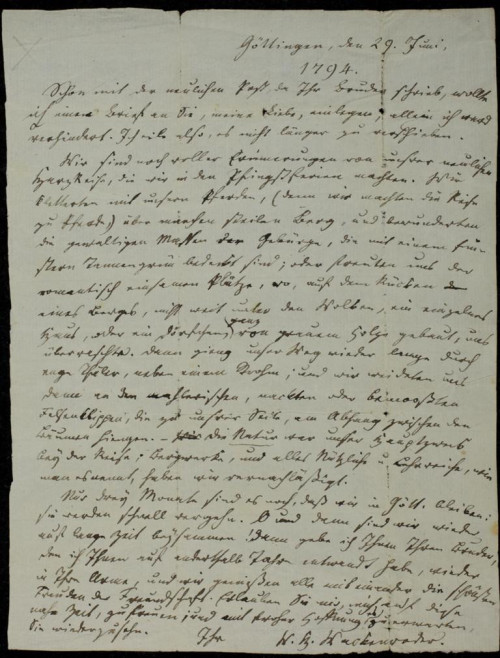In the display case of this installation is a letter dating from the summer of 1794. At the top are the place and date, at the end a signature. The salutation “meine Liebe” (“my dear”) has been included in the body of the letter, which was written in kurrent, a script widely in use for a long time.
Wilhelm Heinrich Wackenroder, the writer, had just taken a tour through the Harz Mountains, on foot and on horseback, with his friend and fellow student Ludwig Tieck. Now he was in nearby Göttingen. In the letter he describes the tour in some detail: “Nature was our main reason for taking this trip; we neglected mines and everything that people call useful and instructive.” In other words, the two young men had taken an educational journey with a difference: We “delighted in the romantically lonely places”.
Here the word “romantic” is especially conspicuous. The German word “romantisch” was derived from “Roman”, the word for “novel”. So initially it meant “as in a novel” and was used above all to refer — rather contemptuously — to freely invented stories and unlikely occurrences. But that changed over time: In a development that began in England, people came to hold the invented and marvellous in higher regard. At the end of the eighteenth century — that is, the period in which this letter was written — the faculty of imagination came to be valued increasingly: Now the word “romantic” virtually became shorthand for a perception of the world shaped by feeling and fantasy.
The words “romance” and “romantic” are still in use today. The wall display above the writing desk offers an impression of the wealth of terms and meanings that have been associated with this semantic field in everyday life. It also invites you to take a moment and think about what comes to your mind when you hear the word “romantic” or “romance”.
Incidentally, the recipient of Wackenroder’s letter was Sophie Tieck, his friend Ludwig’s sister. By sharing the experience with her in a letter, he expanded the two men’s bond of friendship to include a woman. And that brings us to two further important themes of Romanticism: friendship and the relationship between the sexes.
